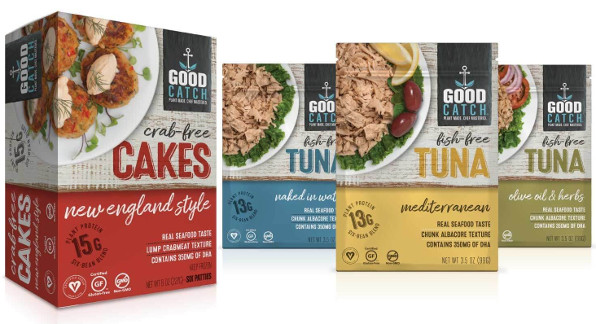The world-renowned food research facilities at Canada’s University of Guelph have snagged a prestigious 2-year grant to develop Plant-based Protien products that actually look and eat like animal Meat. Plant-based Meat alternatives exist, but they cant match the look and chew consumers want…
 Good Catch, a U.S. Start-up boasts that it already offers plant-based Fish and
Good Catch, a U.S. Start-up boasts that it already offers plant-based Fish and
Seafood substitutes: including New England Style Crab Cakes with ‘Lump
Crabmeat’ texture, Thai Style Fish Sliders (with ‘Flaky Whitefish texture’),
Classic Fish Burgers (again, with the ‘Whitefish texture’), and three
flavours of Tuna alternatives. But they’re not quite there, yet.
The Good Food Institute (GFI), an non-profit organization headquartered in Washington, DC, chose Guelph as one of 8 recipients of grants for various research programs over the next several years.
Guelph will take an interdisciplinary approach to the $330 K engineering project designed to get over the hump that Plant-based Meat substitutes currently face: reproducing the appearance and texture of full-muscle Animal Meats that consumers say would help them accept Plant-based products more readily. The hope is that makers of Plant-based Protein products can grab a larger segment of the market and take some of the pressure off the environment.
“Environmental sustainability is the main reason to conduct this research,” said Dr. Mario Martinez, explaining that it takes about six kilograms of plant protein to make one kilogram of meat protein via the conventional Meat production process, of feeding the Plant Protein to Animals for ‘conversion’.
The specific goal of the project…
Guelph scientists and engineers are specifically trying to develop prototype Plant-based substitutes for Beef, Chicken and Fish whole muscle tissues. The idea is to create the technology and processes needed to find the whole-muscle ‘Holy Grail’. Companies like Beyond Meat (Burger pictured at top of page), Good Catch and Impossible Foods have pioneered the production of Plant-based Beef and Fish products that have the flavour of the real thing, but they’ve been stalled at the ‘Ground Meat and Burger’ stage of development on texture and appearance.
A huge and growing market…
The global market for plant-based Meat alternatives is currently estimated at (US)$4.63 billion a year with projections it will grow to (US)$6.30 billion by 2023. Imagine how big it could get if science and technology are successful in mimicking the appearance and texture of whole-muscle Animal Meat.
That’s great for the environment, and the sustainability of our world-wide food supply, but conventional Meat producers are frightened they’ll lose their livelihoods. Last year, Missouri became the first U.S. state to enact legislation requiring non-Meat products to be clearly labelled as such. The new law was a reaction to intensive lobbying by groups such as the U.S. Cattlemen’s Association. Other U.S. jurisdictions have followed suit. Similar lobbying efforts are underway in France, the UK and Canada, to name just a few others.
My take…
The move to plant-based Protein products is inevitable if we’re to survive the coming food crisis – expected to come to its climax around 2050. I’ve advocated in the past for conventional Meat producers to start thinking now about how to evolve their businesses into the future.
As I said in a post just a year ago, ranchers should be looking at ways to modernize their operations, directions in which they can take their business model so that they still have a place in a ‘slaughterless’ future.
Maybe they should be looking at marketing their product as a premium-priced boutique treat, the way Wagyu and other styles of Beef are already marketed.
Maybe they should be playing up the ‘traditional’ aspect of their products to capture the market segment that wants to see its ‘Beef’ on the bone, in traditional cuts and presentations. After all, we don’t all want Burgers all the time. I can’t see a day when chefs and diners won’t want to prepare and enjoy conventional chops and steaks and roasts.
And… Traditional ranchers should be looking at other uses for their vast, rich lands. If a far-future ‘Meat’ industry wants Soy instead of sows, ranchers should be preparing to feed that need. That, of course, would mean putting away their proud traditions and joining the ‘dirt farmers’, but they would at least still be making a good living and keeping their land in production!
~ Maggie J.

